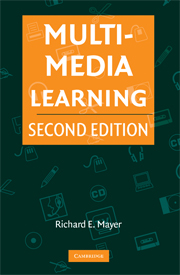Book contents
- Frontmatter
- Contents
- PREFACE
- SECTION I INTRODUCTION TO MULTIMEDIA LEARNING
- SECTION II PRINCIPLES FOR REDUCING EXTRANEOUS PROCESSING IN MULTIMEDIA LEARNING
- SECTION III Principles for Managing Essential Processing in Multimedia Learning
- 9 Segmenting Principle
- 10 Pre-training Principle
- 11 Modality Principle
- SECTION IV PRINCIPLES FOR FOSTERING GENERATIVE PROCESSING IN MULTIMEDIA LEARNING
- SECTION V CONCLUSION
- REFERENCES
- AUTHOR INDEX
- SUBJECT INDEX
- References
10 - Pre-training Principle
- Frontmatter
- Contents
- PREFACE
- SECTION I INTRODUCTION TO MULTIMEDIA LEARNING
- SECTION II PRINCIPLES FOR REDUCING EXTRANEOUS PROCESSING IN MULTIMEDIA LEARNING
- SECTION III Principles for Managing Essential Processing in Multimedia Learning
- 9 Segmenting Principle
- 10 Pre-training Principle
- 11 Modality Principle
- SECTION IV PRINCIPLES FOR FOSTERING GENERATIVE PROCESSING IN MULTIMEDIA LEARNING
- SECTION V CONCLUSION
- REFERENCES
- AUTHOR INDEX
- SUBJECT INDEX
- References
Summary
Pre-training Principle: People learn more deeply from a multimedia message when they know the names and characteristics of the main concepts.
Example: A no pre-training version consists of a multimedia lesson such as a narrated animation explaining how a car's braking system works. A pre-training version consists of a multimedia lesson preceded by training on the names and characteristics of the key parts, such as a narrated animation on how a car's braking system works preceded by training that shows the location of the piston in the master cylinder, the brake tube, the wheel cylinders, and so on, as well as the states that each part can be in.
Theoretical Rationale: In viewing a fast-paced narrated animation that explains the steps in a process, learners have to mentally construct a causal model of the system (i.e., a model of how the system works) as well as component models for each key part in the system (i.e., a model of the key states that each part can be in). Pre-training can help manage these two demands for essential processing by distributing some processing to a pre-training episode that occurs before the main lesson.
Empirical Rationale: In five out of five tests, people performed better on problem-solving transfer tests when a multimedia lesson was preceded by pre-training in the names and characteristics of each key component. The median effect size was d = 0.85.
Information
- Type
- Chapter
- Information
- Multimedia Learning , pp. 189 - 199Publisher: Cambridge University PressPrint publication year: 2009
